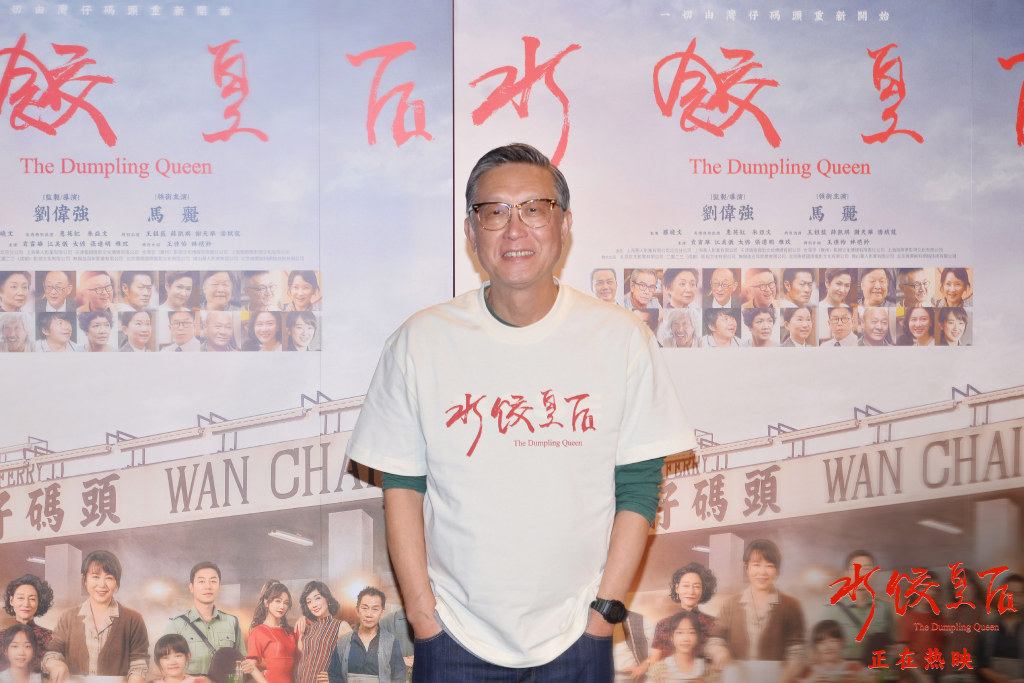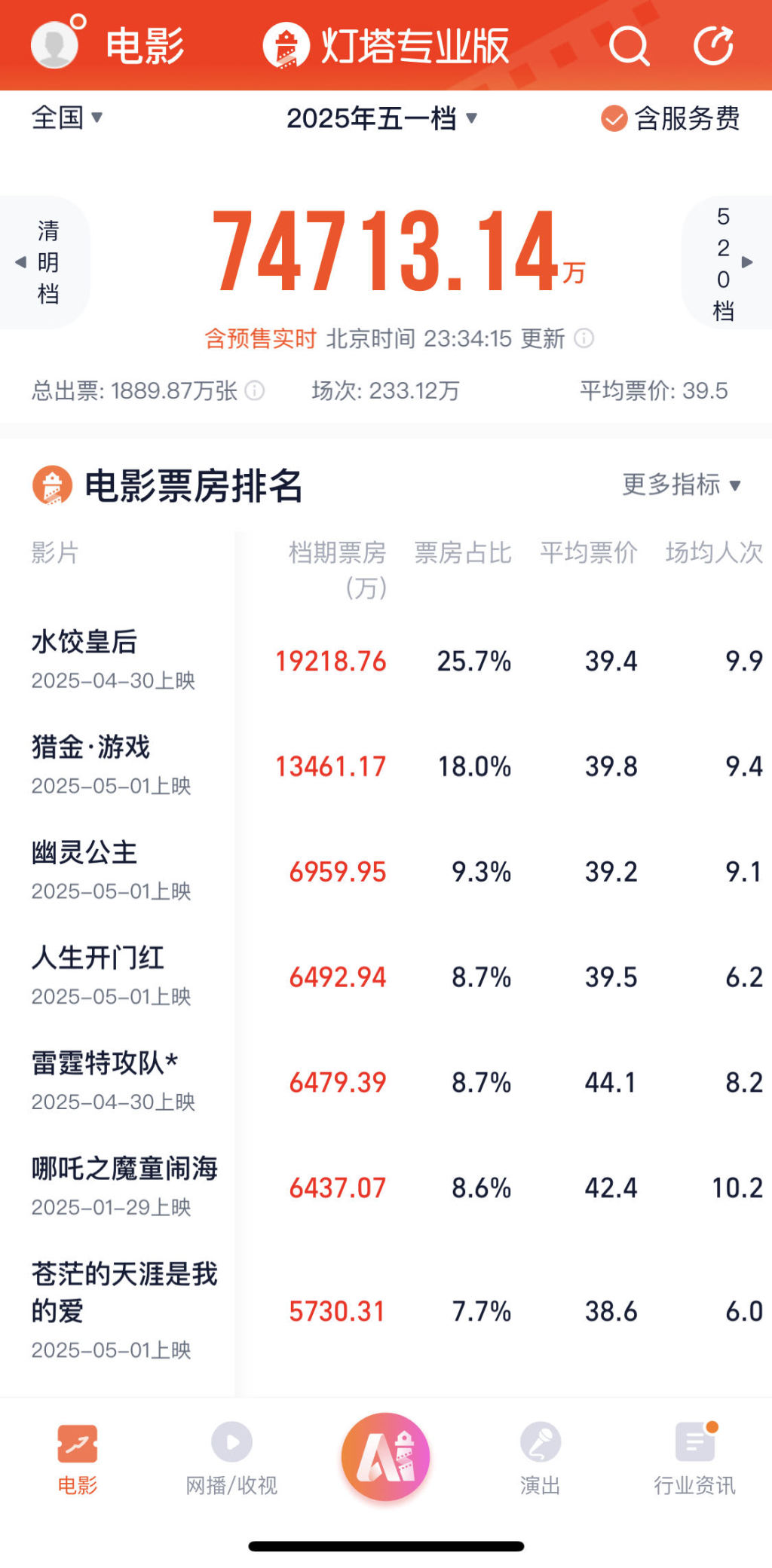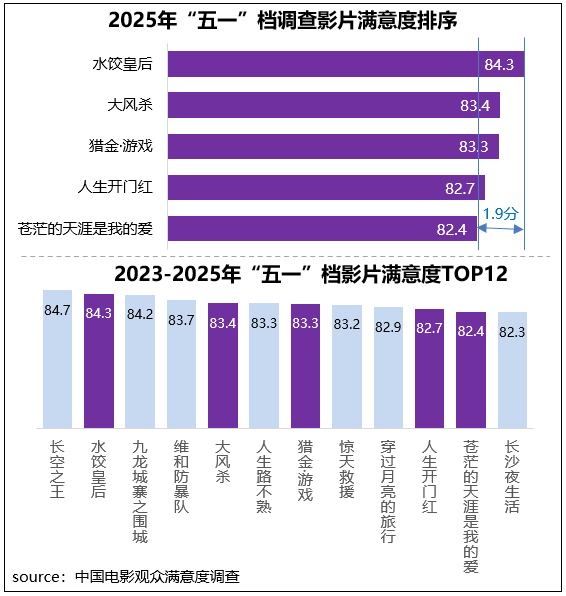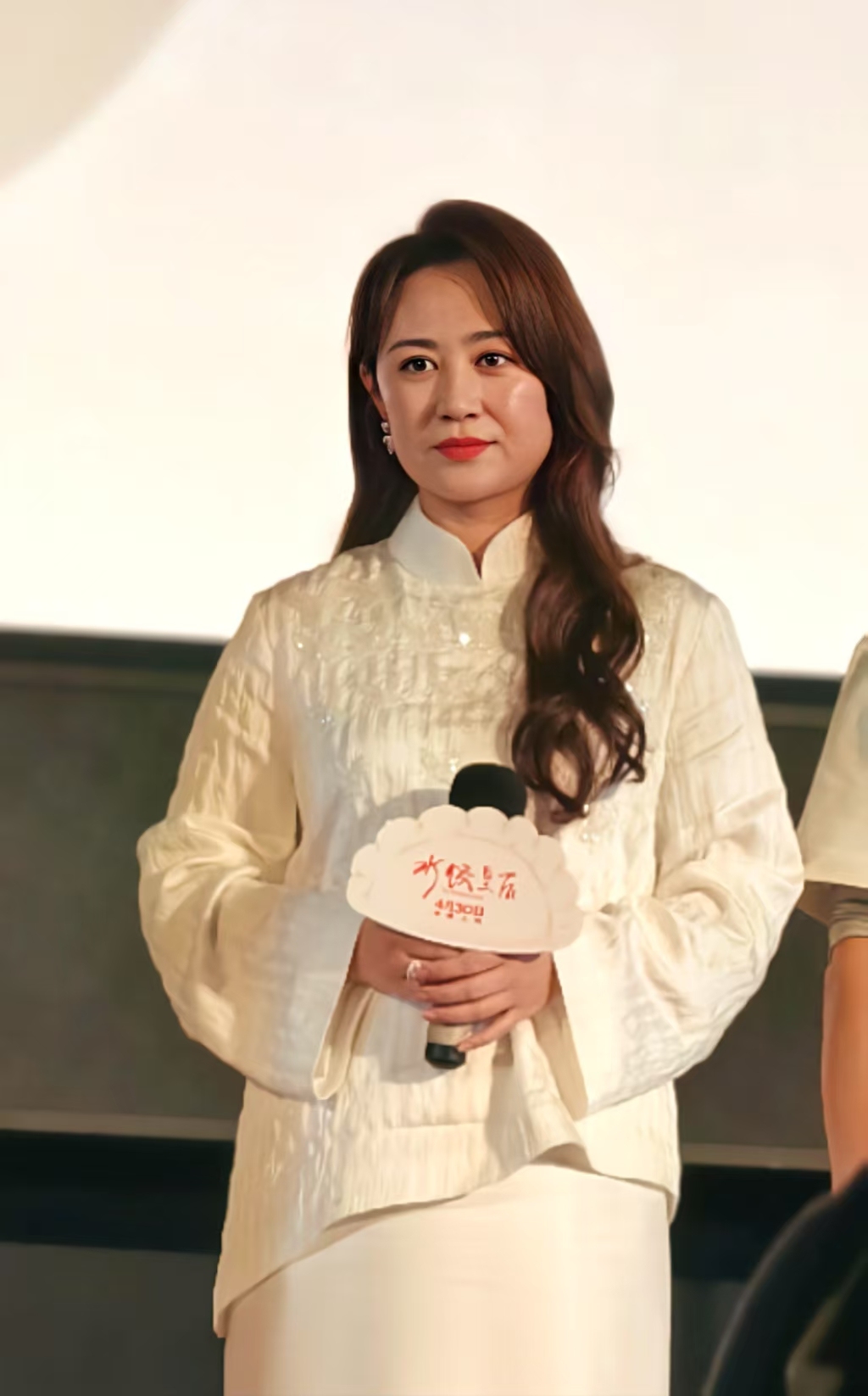
As a seed player for the May Day period in 2025, the Dumpling Queen directed by Andrew Lau grossed over 100 million yuan in three days and is still leading the schedule. The film is adapted from a true story, spanning the late 1970s to the early 21st century, and recreates the struggle story of an ordinary woman who started from scratch. This is also the first time that Andrew Lau, who has often filmed in the mainland in recent years, has turned his camera to Hong Kong, where he grew up.

On May 1, director Andrew Lau took a photo at the premiere of "Dumpling Queen" in Hong Kong, China
He joined Shaw Brothers in the 1980s, became a crew photographer in 1985, and started directing in 1990. The Young and Dangerous series directed by Andrew Lau before and after the handover of Hong Kong made him famous. After entering the new century, the Infernal Affairs trilogy directed by him and Alan Mak pushed his career to the peak, becoming the brightest afterglow at the end of the golden age of Hong Kong films.
Looking at Liu Weiqiang's works in the past decade, from "The Founding of an Army" to "The Captain" and "Chinese Doctor", it can be seen that he is not unfamiliar with the cultural spectrum and the tone of social conditions and public opinion in the mainland, and is even quite familiar with them.

Stills from "Dumpling Queen"
It is precisely because of his proficiency in directing films about the two places that "The Dumpling Queen" has a unique charm: on the one hand, it is the director's "return" to his hometown. When presenting the bustling atmosphere of Hong Kong's streets and depicting the interpersonal relationships of mutual help among neighbors, the film can be said to be "broad and meticulous", and can be regarded as another "Hong Kong famous quote" under the Lion Rock.
On the other hand, the spirit of Hong Kong people who are proud to rise up and advocate personal struggle is concentrated in Miss Zang who came from Qingdao, and she is played by the actress Ma Li from the mainland. In addition to Ma Li, the film also stars Hui Yinghong, Zhu Yawen, Pan Binlong, Feng Wenjuan and other actors. The film is a touching story, and it is also a model of the historical process of interaction between people and cultures of the two places.

The film "Dumpling Queen" wrap-up photo
Homesickness is common, as can be seen from the fact that Liu Weiqiang used a lot of old Cantonese songs as the soundtrack for "The Dumpling Queen". When the reporter asked this question during an interview with The Paper, the director immediately showed the excitement and satisfaction of a close friend. He asked his assistant to present a list of songs that appeared in the film, "I will give a copy to every reporter who asks me this question. This is my 'personal playlist'."

Andrew Lau's "Private Playlist" for the Journalists
【dialogue】
Everyone in Hong Kong knows Miss Zang's story
The Paper: I noticed that you were very emotional on the set during the filming of "The Dumpling Queen". There was a scene where Big Brother Wu Zhixiong brought his men to Miss Zang's dumpling stall to collect protection money. Miss Zang couldn't bear the humiliation and waved a kitchen knife in front of her daughter to fight them to death. I heard that you cried several times while filming this scene.
Liu Weiqiang: When I was a child, I lived in Tai Kei Ling Village, Yuen Long, New Territories, which is a suburb of Hong Kong. I remember when someone wanted to demolish our house, my mother stood in front of them and said, "This is my home. If you dare to come over, I will fight you to the death!" She said to us children, "Don't be afraid, your mother is here." This incident left a deep impression on me, and I think my mother is really a brave woman.

Stills from "Dumpling Queen"
When shooting the scene you mentioned, Miss Zang also stood in front of her two daughters. Big Brother B was shocked by her aura and said, "She really looks like my mother." This is actually how I felt. At that moment, I thought of my mother and my childhood. When editing this scene, I specifically found a family photo of my mother and I when I was a child, and put a real black-and-white photo in it. I really put a lot of personal emotions into this scene.
The Paper: As the saying goes, one feels homesick when close to home. Dumpling Queen is also the first film you have directed in the past decade to focus on your hometown, Hong Kong. You once said, "Every time I shoot a movie, there is a landmark." For example, Causeway Bay in Young and Dangerous, Sheung Wan and Central in Infernal Affairs, Central in City of Pain, Temple Street in Temple Street Story, etc. The landmark of this film is undoubtedly Wan Chai Pier. Can you tell us about your personal story with this place, and how you carved the texture of this urban space in the film?
Andrew Lau: I lived in a rural area in Yuen Long when I was a child. Later, my family moved to Garbor House on Leighton Road in Causeway Bay. I grew up in Causeway Bay during my teenage years. I remember that it was not far from our home. It took less than ten minutes to walk to Happy Valley. A little further west was the pier. These were places I often passed by. Causeway Bay is in Wan Chai District, so I am very familiar with this area. You know that the current Times Square (shopping mall) in Causeway Bay was originally the Hong Kong Tramway Depot, which is where the character Tara, played by Cheung Tat-ming in the film, worked. There were many shops and vegetable markets nearby at that time, and I often accompanied my mother to buy vegetables.
The street scenes in Wan Chai District in "The Dumpling Queen" basically correspond to Hong Kong from 1977 to the 1980s, so many scenes were rebuilt by us. For example, the cubicle of Hong Jie's house, the pier at that time, the shops and billboards of that time, etc., are now gone or completely changed. There are my personal memories in it, and I also looked through a lot of historical photos and video materials, trying my best to restore the street scenes at that time, including people's clothing and appearance, which took a lot of time in the early stage.

On-set photo: Director Andrew Lau poses with Kara Hui, Cheung Tat-ming and Ma Li
The Paper: Can you tell us about the tradition of dumplings in Hong Kong? In the 1970s and 1980s, Miss Zang's dumplings became popular in Hong Kong. Have you ever eaten her dumplings?
Liu Weiqiang: I know that friends in the mainland have the tradition of eating dumplings on New Year's Eve, and friends in the north also have the tradition of "dumplings on the bus, noodles when getting off the bus". But in Hong Kong, we usually eat wonton noodles, not "dumpling noodles" (laughs).
Why am I interested in making this film? Because everyone in Hong Kong knows Miss Zang's story. She came to Hong Kong alone with her two daughters and set up a stall at the pier to sell handmade dumplings. At the beginning, most Hong Kong people didn't know what dumplings were. It was because her dumplings were delicious and she was very enthusiastic and business-oriented that she became famous in Hong Kong when she set up a stall with a cart. It can be said that it is the memory of a generation. Back then, everyone really lined up to eat her dumplings. My mother went there, and I went there too. Including Kara Hui, and Lam Shanshan, who made a cameo appearance in the film this time. She is Ekin Cheng's agent. They all patronized Miss Zang's dumpling stall back then. When they saw Ma Li on the set, they all thought she looked too much like Miss Zang.
We filmed "The Dumpling Queen" not only to reproduce how Miss Zang made and sold dumplings, but also to reflect her unyielding fighting spirit in the face of life's difficulties. A woman with two children, helpless in Hong Kong, turned dumplings into such a big industry with her own hands. It's amazing, and it has inspirational significance for everyone who is trying to make a living today.
Another thing is that I also want to show the human touch of the past in this film. The mutual help between neighbors is not so much a tradition of Hong Kong people, but a tradition of all Chinese people. This was the living environment when I was a child. Everyone was very poor. If the neighbors bought too much vegetables, they would take the initiative to share them with their neighbors. Of course, there are bad people in society, but after all, there are more good people and kind people. When I talked about the play with Ma Li, she also agreed with this point. She also witnessed this kind of friendship between neighbors when she was a child.
When the song starts, there is no need for the actors to open their mouths to express it.
The Paper: Miss Zang’s daughter also came to visit the set. What kind of communication did you have with her?
Andrew Lau: She told me a lot about her mother, and she also met with the screenwriter many times afterwards and provided a lot of information. For example, she told me that when the family first came to Hong Kong's Cheung Chau Island, she got lost while delivering goods. Zang Jianhe went crazy looking for the child, and was very angry when he saw the child. He vented all his grievances on his daughter, but when he saw his daughter fell and got injured, he was very sad, hugged them and said, "I will never let you suffer in the future." We filmed all these past events in the movie.
There are many details, such as when Beibei and Pengpeng helped their mother make dumplings when they were young. Beibei could make up to 60 dumplings in 1 minute, while Miss Zang could make 100 dumplings in about 1 minute. For another example, because dumplings were not popular in Hong Kong at that time, Miss Zang rolled the dumpling skin too thick at first. Some diners told her that although the filling was delicious, it was not exquisite to do so. She studied for three days and three nights and found that the dumpling skin was rolled 10 times before, and the skin was the thinnest after rolling 15 times, which was just right. But it is easy to fall apart when cooked (the filling is exposed), so she went to ask the shop selling wonton noodles how to make the dumpling skin tough? She found that alkaline water should be added when kneading the dough, but it didn’t taste right with only alkaline water, so she learned to add salt water to neutralize the taste.
The Paper: I was deeply impressed by the key prop in the film, the five-cent coin wrapped in the dumpling stuffing. This coin was originally put into the dumplings by Miss Zang's mother before she left, as a "tongue-suppressing money". She brought the coin to Hong Kong, and it appeared many times in the film. It later became a symbol of Miss Zang's courage to resist the injustice of fate and the awakening of female self-awareness. Please talk about this as well.
Andrew Lau: This is a Chinese tradition. When a family makes dumplings, they put a coin in the filling. Whoever eats it will have good luck. We did some artistic processing in the film and used its connotation beautifully.
I think the most interesting part is that before Hua went to Canada, Miss Zang and Hong Gu invited him to eat dumplings. He was eager to eat the coin, and his good wishes came true, but in the end he failed to do so. For Miss Zang, she did not put the dumplings with the coin into the pot for Hua to eat, which actually showed her inner conflict: should she choose love or career? She finally chose to make dumplings bigger and stronger.
The Paper: There are many Cantonese songs in the movie, such as Roman Tam's "Family Changes" and Beyond's "Glorious Years", which can be regarded as a medley of old Cantonese songs. Is there any song that you insisted on using?
Andrew Lau: In addition to the theme song "Letter" sung by Chris Lee, there are nine other songs in the movie, including old Cantonese songs and English songs, all of which were carefully selected by me and are my "personal playlist". When Miss Zang and Mr. Tangshui (played by Yuan Fuhua) set up a stall at Wan Chai Pier, they used Sam Hui's "Half a Catty, Eight Taels", "We are a group of migrant workers (we migrant workers)..."; to show the innocence and romance of the little girls Beibei and Pengpeng, a very famous Cantonese nursery rhyme from the 1970s and 1980s, "Little Universe" was used; the scene where Brother Hua and Miss Zang broke up, used David Gates' "Goodbye Girl", which is my favorite English song.
This is actually a kind of film language and technique. The lyrics and melody of these songs fit the plot very well, and the actors don't need to open their mouths to express themselves when the songs start.
The Paper: The film adopts a linear narrative, with the years 1977 and 1982 highlighted. They are not only key nodes in the life and career development of the protagonist, but are also related to the grand historical background. Please talk about your understanding of the film's story framework.
Andrew Lau: This was intentional. It can be said that it not only witnessed the struggle story of Miss Zang in the film, but also looked back at our past growth. For example, when I was a child, the subway in Causeway Bay had not yet been built. In 1985, the Hong Kong MTR Island Line was opened, and then there were Fortress Hill Station and Tin Hau Station. The opening of the subway promoted the prosperity of the Causeway Bay area. It was also around this time that Miss Zang's business grew bigger and bigger. Frozen dumplings had their own brand and were sold in supermarkets. I put my own feelings and many personal experiences into this movie.
Movies must be artistically processed to be good
The Paper: On the one hand, "The Dumpling Queen" must respect the real experiences of the people involved, and on the other hand, it must also make appropriate artistic fiction. Between the real and the imaginary, please talk about your standard principles and methodology as a producer and director.
Liu Weiqiang: I think movies must be artistically processed to be good. Basically, Miss Zang's entrepreneurial struggle story, why she wants to sell dumplings, how to make dumplings, how to make such a big business, all have real prototype stories as a basis. As for her personal life, especially the stories with all kinds of people around her, we have done some artistic processing on these.
For example, after a failed marriage, Miss Zang never remarried, but we added her love scenes with Brother Hua in the film. For example, the scene where Ma Li and Zhu Yawen dated in the cemetery was filmed in the cemetery in Happy Valley, which was a very beautiful and peaceful environment. When researching materials, I found that Zang Jianhe himself liked to go to the cemetery, read the epitaphs of the tomb owners, and feel their lives. I often went to the cemetery in the film when I was a child, so I am very familiar with it.
There was also the scene where Miss Zang and Brother Hua parted ways, where she didn't let him eat the dumpling with the coin in it - my habit when filming is to finish filming every day and edit the film in the evening. When I was editing this scene, all the girls around me were crying.
In this movie, every actor gave sincere emotions, so the film is so touching. Even during the road show, I would secretly sit in the theater to watch the audience's reactions.
The Paper: You are a professional photographer and have served as the president of the Hong Kong Professional Cinematographers Association. How do you define the image style of "The Dumpling Queen"? In addition, handheld photography is also a major feature of your films. Christopher Doyle praised you as "the best handheld camera operator in Hong Kong". Did you also shoot the handheld camera shots in this film yourself?
Andrew Lau: I was completely relaxed this time. The style of the film is to present a story of a person's struggle and success in a very natural and plain way. The lighting on the set was also very natural and realistic to record the story.
And the most important point is, why do I still carry the camera myself? The things you shoot should have emotions. It is very easy for me to shoot something beautiful. It is easy to shoot beautiful pictures, but it is very difficult to make these pictures have emotions and make the audience feel immersive and not feel the camera.
Why did I choose handheld photography in the past? There is no secret, it was just because I had no money (laughs). When I was shooting Young and Dangerous, I had no money and could only use Steadicam for hand control. Later, I felt that handheld photography was the most emotional and could project my emotions. The unity of man and machine requires practice and a lot of effort. Now my hands often hurt and cramp because they are often the sequelae of holding the machine myself.
Nowadays, many directors only sit behind the monitor and shout "CUT" without communicating with the actors. This time, I shot a lot of "Dumpling Queen" by myself, and was very close to the actors and interacted with them. This kind of communication is the best and most direct, and I have always insisted on using this method.
The Paper: Ma Li is one of the most box office-appealing female stars in mainland China, but she has mostly starred in comedies in the past. This time she was invited to play Miss Zang. What similarities do you think there are between them?
Andrew Lau: How can there be no good actors in comedy? Besides, I never thought that she was just a comedian and couldn't act in a serious drama. I always say that if Ma Li wasn't there, this movie wouldn't be made, and I never doubted her ability for even a minute.
For example, in that scene, Miss Zang went to set up a stall to sell dumplings, but she couldn't sell a single dumpling. She was very disappointed when she got home, and Sister Hong called her out to eat noodles. They performed this scene very well. The two women shouted "dumplings!" "Handmade dumplings!" in the dead of night, and they portrayed the characters' emotions vividly.
The Paper: The Dumpling Queen brings together many mainland and Hong Kong celebrities, for example, Zhu Yawen plays a Hong Kong policeman from Shandong. Over the past decade, your work has focused on filming in the mainland. Can you tell us how you blend the auras of actors from both places?
Andrew Lau: We have been co-producing films for so many years, and we are getting more and more familiar with each other. As Hong Kong directors, we also have our own style, but we are very flexible and will make changes and adapt. In fact, when you really put your heart into making a movie, it will not be smooth sailing. It takes a lot of twists and turns to get to where you are today.
During this process, many mainland directors also helped me and gave me a lot of good advice. I also had a great time working with mainland actors. For example, I am still in touch with Huang Zhizhong in Infernal Affairs 3. During the filming of The Founding of an Army, I met a large number of excellent mainland actors, such as Zhu Yawen, who later starred in The Captain and Chinese Doctors, which I directed.


